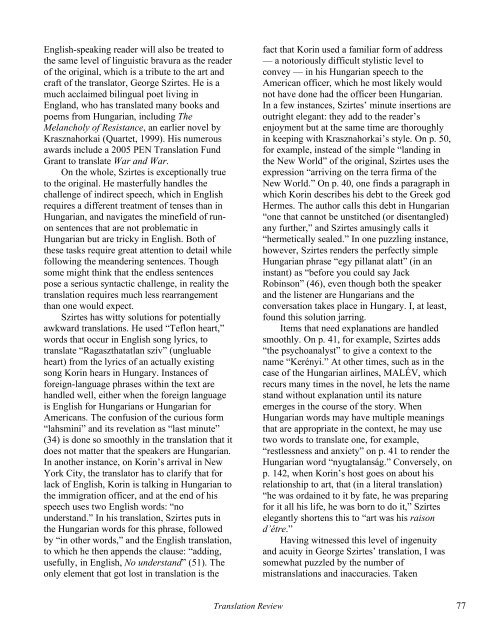Translation Review - The University of Texas at Dallas
Translation Review - The University of Texas at Dallas
Translation Review - The University of Texas at Dallas
You also want an ePaper? Increase the reach of your titles
YUMPU automatically turns print PDFs into web optimized ePapers that Google loves.
English-speaking reader will also be tre<strong>at</strong>ed to<br />
the same level <strong>of</strong> linguistic bravura as the reader<br />
<strong>of</strong> the original, which is a tribute to the art and<br />
craft <strong>of</strong> the transl<strong>at</strong>or, George Szirtes. He is a<br />
much acclaimed bilingual poet living in<br />
England, who has transl<strong>at</strong>ed many books and<br />
poems from Hungarian, including <strong>The</strong><br />
Melancholy <strong>of</strong> Resistance, an earlier novel by<br />
Krasznahorkai (Quartet, 1999). His numerous<br />
awards include a 2005 PEN <strong>Transl<strong>at</strong>ion</strong> Fund<br />
Grant to transl<strong>at</strong>e War and War.<br />
On the whole, Szirtes is exceptionally true<br />
to the original. He masterfully handles the<br />
challenge <strong>of</strong> indirect speech, which in English<br />
requires a different tre<strong>at</strong>ment <strong>of</strong> tenses than in<br />
Hungarian, and navig<strong>at</strong>es the minefield <strong>of</strong> runon<br />
sentences th<strong>at</strong> are not problem<strong>at</strong>ic in<br />
Hungarian but are tricky in English. Both <strong>of</strong><br />
these tasks require gre<strong>at</strong> <strong>at</strong>tention to detail while<br />
following the meandering sentences. Though<br />
some might think th<strong>at</strong> the endless sentences<br />
pose a serious syntactic challenge, in reality the<br />
transl<strong>at</strong>ion requires much less rearrangement<br />
than one would expect.<br />
Szirtes has witty solutions for potentially<br />
awkward transl<strong>at</strong>ions. He used “Teflon heart,”<br />
words th<strong>at</strong> occur in English song lyrics, to<br />
transl<strong>at</strong>e “Ragaszth<strong>at</strong><strong>at</strong>lan szív” (ungluable<br />
heart) from the lyrics <strong>of</strong> an actually existing<br />
song Korin hears in Hungary. Instances <strong>of</strong><br />
foreign-language phrases within the text are<br />
handled well, either when the foreign language<br />
is English for Hungarians or Hungarian for<br />
Americans. <strong>The</strong> confusion <strong>of</strong> the curious form<br />
“lahsmini” and its revel<strong>at</strong>ion as “last minute”<br />
(34) is done so smoothly in the transl<strong>at</strong>ion th<strong>at</strong> it<br />
does not m<strong>at</strong>ter th<strong>at</strong> the speakers are Hungarian.<br />
In another instance, on Korin’s arrival in New<br />
York City, the transl<strong>at</strong>or has to clarify th<strong>at</strong> for<br />
lack <strong>of</strong> English, Korin is talking in Hungarian to<br />
the immigr<strong>at</strong>ion <strong>of</strong>ficer, and <strong>at</strong> the end <strong>of</strong> his<br />
speech uses two English words: “no<br />
understand.” In his transl<strong>at</strong>ion, Szirtes puts in<br />
the Hungarian words for this phrase, followed<br />
by “in other words,” and the English transl<strong>at</strong>ion,<br />
to which he then appends the clause: “adding,<br />
usefully, in English, No understand” (51). <strong>The</strong><br />
only element th<strong>at</strong> got lost in transl<strong>at</strong>ion is the<br />
fact th<strong>at</strong> Korin used a familiar form <strong>of</strong> address<br />
— a notoriously difficult stylistic level to<br />
convey — in his Hungarian speech to the<br />
American <strong>of</strong>ficer, which he most likely would<br />
not have done had the <strong>of</strong>ficer been Hungarian.<br />
In a few instances, Szirtes’ minute insertions are<br />
outright elegant: they add to the reader’s<br />
enjoyment but <strong>at</strong> the same time are thoroughly<br />
in keeping with Krasznahorkai’s style. On p. 50,<br />
for example, instead <strong>of</strong> the simple “landing in<br />
the New World” <strong>of</strong> the original, Szirtes uses the<br />
expression “arriving on the terra firma <strong>of</strong> the<br />
New World.” On p. 40, one finds a paragraph in<br />
which Korin describes his debt to the Greek god<br />
Hermes. <strong>The</strong> author calls this debt in Hungarian<br />
“one th<strong>at</strong> cannot be unstitched (or disentangled)<br />
any further,” and Szirtes amusingly calls it<br />
“hermetically sealed.” In one puzzling instance,<br />
however, Szirtes renders the perfectly simple<br />
Hungarian phrase “egy pillan<strong>at</strong> al<strong>at</strong>t” (in an<br />
instant) as “before you could say Jack<br />
Robinson” (46), even though both the speaker<br />
and the listener are Hungarians and the<br />
convers<strong>at</strong>ion takes place in Hungary. I, <strong>at</strong> least,<br />
found this solution jarring.<br />
Items th<strong>at</strong> need explan<strong>at</strong>ions are handled<br />
smoothly. On p. 41, for example, Szirtes adds<br />
“the psychoanalyst” to give a context to the<br />
name “Kerényi.” At other times, such as in the<br />
case <strong>of</strong> the Hungarian airlines, MALÉV, which<br />
recurs many times in the novel, he lets the name<br />
stand without explan<strong>at</strong>ion until its n<strong>at</strong>ure<br />
emerges in the course <strong>of</strong> the story. When<br />
Hungarian words may have multiple meanings<br />
th<strong>at</strong> are appropri<strong>at</strong>e in the context, he may use<br />
two words to transl<strong>at</strong>e one, for example,<br />
“restlessness and anxiety” on p. 41 to render the<br />
Hungarian word “nyugtalanság.” Conversely, on<br />
p. 142, when Korin’s host goes on about his<br />
rel<strong>at</strong>ionship to art, th<strong>at</strong> (in a literal transl<strong>at</strong>ion)<br />
“he was ordained to it by f<strong>at</strong>e, he was preparing<br />
for it all his life, he was born to do it,” Szirtes<br />
elegantly shortens this to “art was his raison<br />
d’étre.”<br />
Having witnessed this level <strong>of</strong> ingenuity<br />
and acuity in George Szirtes’ transl<strong>at</strong>ion, I was<br />
somewh<strong>at</strong> puzzled by the number <strong>of</strong><br />
mistransl<strong>at</strong>ions and inaccuracies. Taken<br />
<strong>Transl<strong>at</strong>ion</strong> <strong>Review</strong> 77

















